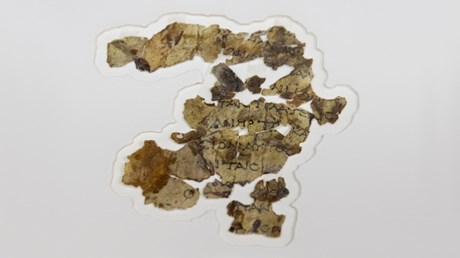Tiny fragments of the minor prophets in Greek show that scribes adapted texts in similar ways to our contemporary versions.

Israeli researchers and archaeologists unveiled this week several groundbreaking discoveries, including dozens of biblical scroll fragments that represent the first newly uncovered Dead Sea Scrolls in more than half a century.
The Dead Sea Scrolls contain some of the earliest known Jewish religious documents, including biblical texts, dated from the third century B.C. to the second century A.D. The manuscripts were first unearthed in the immediate aftermath of World War II in the caves near Qumran and the Judean Desert.
Even an initial review of the new fragments—which will be analyzed and scrutinized for years to come—offers some exciting findings about how the earliest biblical texts were translated and adapted in ways like our own.
The discovery comes at a time when demand for antiquities has skyrocketed, spurring looting and forgeries over the past several years as wealthy collectors hope to acquire any remaining scraps of the priceless scrolls.
Starting around 2002, a number of widely publicized “Dead Sea Scroll” fragments emerged with questionable origin stories. After a series of illegal attempts to acquire artifacts and scrolls, Israeli Antiquities Authority conducted a series of archaeological surveys to reexamine the interiors of the caves along the cliffs of the Judean Desert.
Beginning in 2017, its researchers uncovered two dozen scroll pieces, each measuring only a few centimeters across, from the so-called Cave of Horror near the western shore of the Dead Sea. It’s a site where insurgents were believed to have hidden during the uprising led by Simon bar Kokhba against the Roman empire in A.D. 133–136. It gets its name from the discovery of 40 bodies during initial excavations ...
from Christianity Today Magazine
via

.gif)

.gif)

.gif)
.gif)
